A Relentless Focus on CPD and High Expectations for All are the Driving Forces at this Coastal School
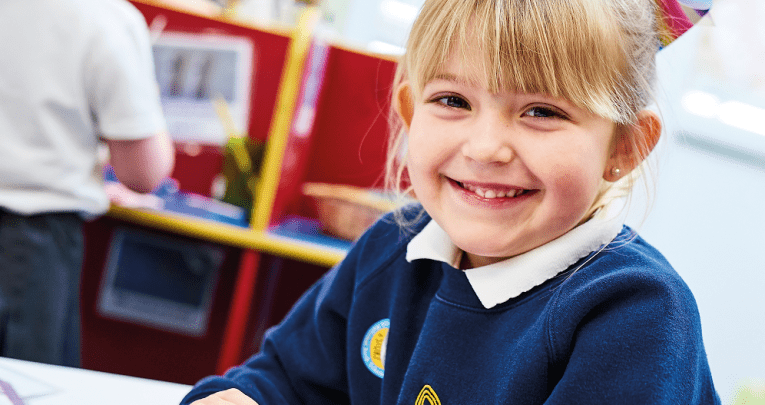
“I'm giving responsibility back to the teachers,” says principal Kate Rutherford
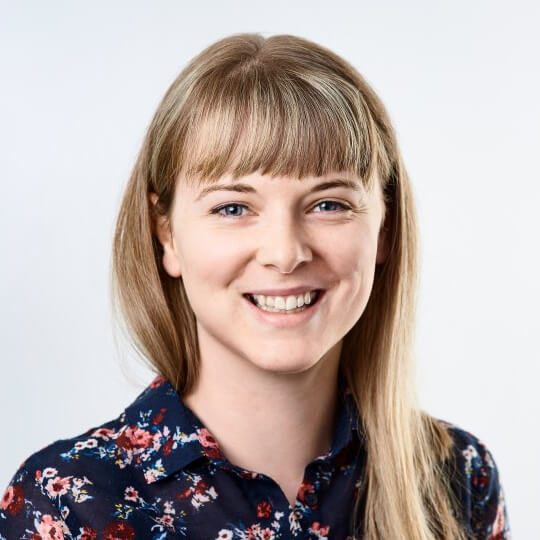
- by Elaine Bennett
- Digital content manager for Teachwire and former Teach Primary magazine editor

When Kate Rutherford took a job as classroom teacher at a middle school in Great Yarmouth over 20 years ago, she was lucky enough to be working under a headteacher who had a passion for professional development.
After being given the opportunity to do both an MA and her National Professional Qualification for Headship, Kate went part-time for six years to raise her children.
“When the role of KS2 lead came up, I thought, ‘I could do that’,” Kate recalls, and it wasn’t long before her aptitude for school leadership meant she’d moved into the role of deputy.
When Norfolk reorganised its middle school system in 2007, the local infant and middle schools merged and Kate was offered the role of head.
Anushka
 For Bad Hair Day we had a cake sale. The cakes were 40p but some people gave 50p. The people running the stall asked if we wanted change. I told them to keep it and other children also did that.
For Bad Hair Day we had a cake sale. The cakes were 40p but some people gave 50p. The people running the stall asked if we wanted change. I told them to keep it and other children also did that.
Meet the staff
Natalie Allen, reception teacher & EYFS lead
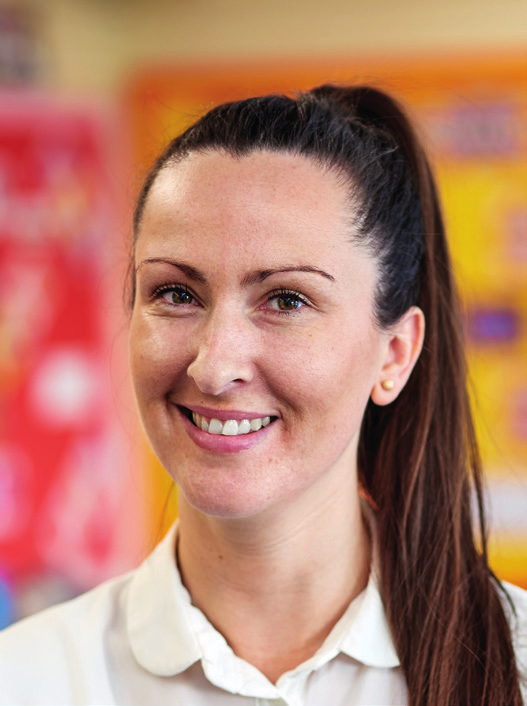 Parents are welcome in class every morning and we encourage them to choose a reading book with their child to get excited about at home. We also have weekly stay and play sessions which are really well attended. The parents stay for half an hour to do some learning with their children and see what they’ve been up to in class.
Parents are welcome in class every morning and we encourage them to choose a reading book with their child to get excited about at home. We also have weekly stay and play sessions which are really well attended. The parents stay for half an hour to do some learning with their children and see what they’ve been up to in class.
Kristy Redhead, Y6 teacher & literacy lead
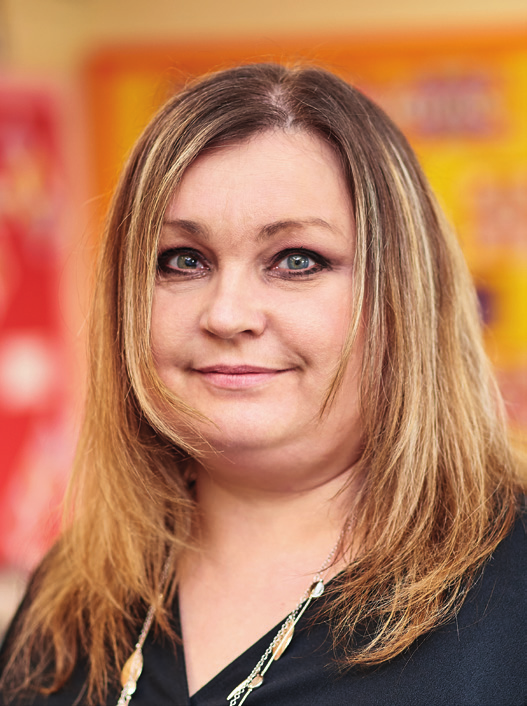 Our planning workloads are not heavy here – it’s literally one A4 sheet of paper a week. We have to know what our objectives are for each subject but that’s pretty much it. As long as we’re covering those, it’s down to us how we go about it. We’re given the time to plan interesting lessons, rather than spending it on paperwork.
Our planning workloads are not heavy here – it’s literally one A4 sheet of paper a week. We have to know what our objectives are for each subject but that’s pretty much it. As long as we’re covering those, it’s down to us how we go about it. We’re given the time to plan interesting lessons, rather than spending it on paperwork.
Alex Shreeve, Y5 teacher & PE lead
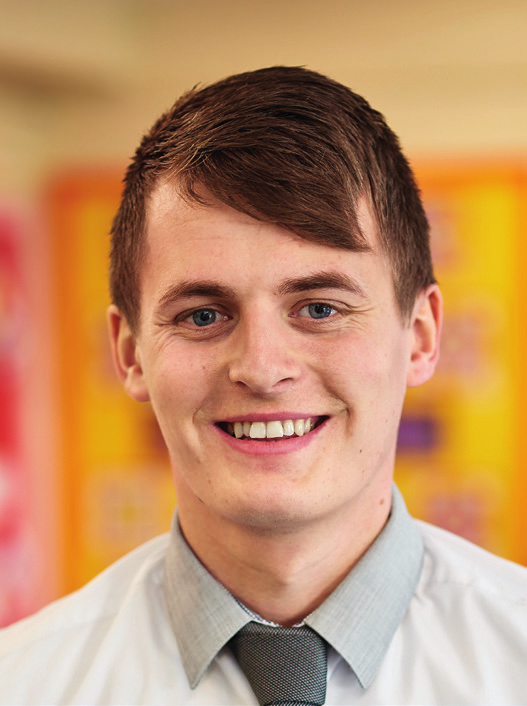 I started as a teaching assistant five years ago. I was heavily involved in sports coaching before but needed a particular qualification to teach PE so I went to speak to Kate about it and she placed me on the course. She suggested that I train as a teacher so I did. Kate gave me the nudge to forward my career and I’m now PE lead.
I started as a teaching assistant five years ago. I was heavily involved in sports coaching before but needed a particular qualification to teach PE so I went to speak to Kate about it and she placed me on the course. She suggested that I train as a teacher so I did. Kate gave me the nudge to forward my career and I’m now PE lead.
Sam White, teaching assistant
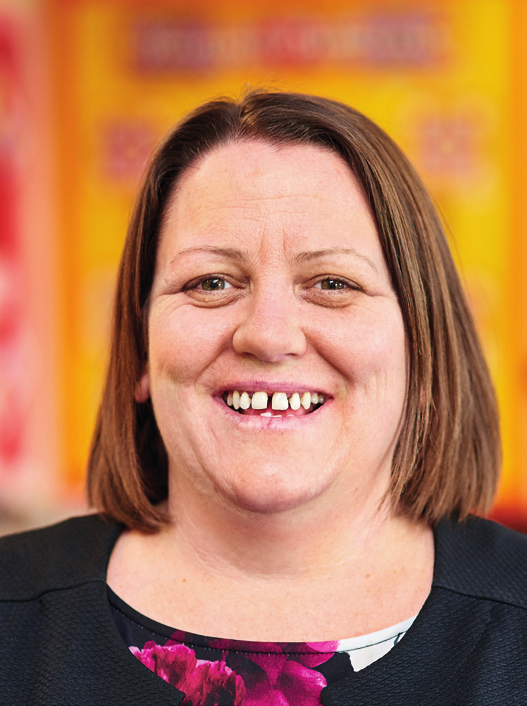 I started here as a one-to-one on a temporary six month contract. I was kept on and I’m now permanent. A couple of years into the role I started doing the fairs. We do three a year and raise quite a lot of money. Lots of TAs and teachers run after-school clubs. You can choose what you want to do – I run cooking and art.
I started here as a one-to-one on a temporary six month contract. I was kept on and I’m now permanent. A couple of years into the role I started doing the fairs. We do three a year and raise quite a lot of money. Lots of TAs and teachers run after-school clubs. You can choose what you want to do – I run cooking and art.
“The relationships they form with the children makes them want to deliver those clubs.” Football is, of course, very popular, but children at the academy also enjoy bushcraft and spy club – a group run by Y2 teacher Charlene Porter where you get your own code name, take fingerprints and crack codes.
Pupil voice
Rhylee
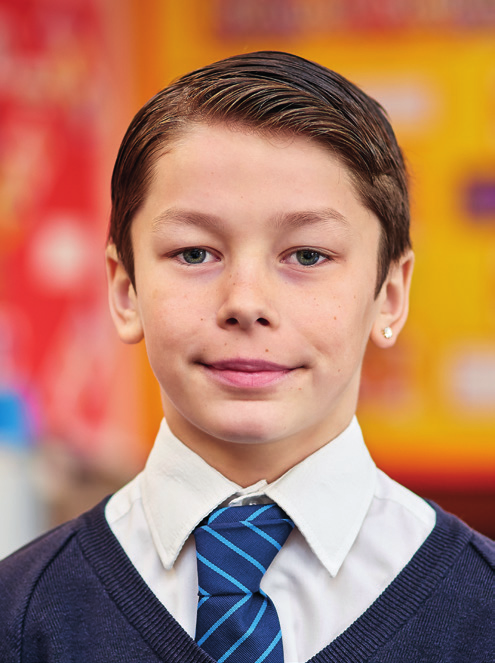 I like football club because I want to be a footballer when I grow up. If you’re in lessons and you’re stuck, the teacher will come round and help you. The teachers help you believe in your dreams.
I like football club because I want to be a footballer when I grow up. If you’re in lessons and you’re stuck, the teacher will come round and help you. The teachers help you believe in your dreams.
Riley
 Recently we had a fundraiser called Bad Hair Day where we raised money for the Break charity by coming to school with bad hairstyles. I had a palm tree – I dyed my hair blue with green tips.
Recently we had a fundraiser called Bad Hair Day where we raised money for the Break charity by coming to school with bad hairstyles. I had a palm tree – I dyed my hair blue with green tips.
Emily
 Every week we do something called a healthy heart assembly. We do the snake run which is where you run around the playground and field about three times, then we do activities afterwards.
Every week we do something called a healthy heart assembly. We do the snake run which is where you run around the playground and field about three times, then we do activities afterwards.
Anushka
 For Bad Hair Day we had a cake sale. The cakes were 40p but some people gave 50p. The people running the stall asked if we wanted change. I told them to keep it and other children also did that.
For Bad Hair Day we had a cake sale. The cakes were 40p but some people gave 50p. The people running the stall asked if we wanted change. I told them to keep it and other children also did that.
Meet the staff
Natalie Allen, reception teacher & EYFS lead
 Parents are welcome in class every morning and we encourage them to choose a reading book with their child to get excited about at home. We also have weekly stay and play sessions which are really well attended. The parents stay for half an hour to do some learning with their children and see what they’ve been up to in class.
Parents are welcome in class every morning and we encourage them to choose a reading book with their child to get excited about at home. We also have weekly stay and play sessions which are really well attended. The parents stay for half an hour to do some learning with their children and see what they’ve been up to in class.
Kristy Redhead, Y6 teacher & literacy lead
 Our planning workloads are not heavy here – it’s literally one A4 sheet of paper a week. We have to know what our objectives are for each subject but that’s pretty much it. As long as we’re covering those, it’s down to us how we go about it. We’re given the time to plan interesting lessons, rather than spending it on paperwork.
Our planning workloads are not heavy here – it’s literally one A4 sheet of paper a week. We have to know what our objectives are for each subject but that’s pretty much it. As long as we’re covering those, it’s down to us how we go about it. We’re given the time to plan interesting lessons, rather than spending it on paperwork.
Alex Shreeve, Y5 teacher & PE lead
 I started as a teaching assistant five years ago. I was heavily involved in sports coaching before but needed a particular qualification to teach PE so I went to speak to Kate about it and she placed me on the course. She suggested that I train as a teacher so I did. Kate gave me the nudge to forward my career and I’m now PE lead.
I started as a teaching assistant five years ago. I was heavily involved in sports coaching before but needed a particular qualification to teach PE so I went to speak to Kate about it and she placed me on the course. She suggested that I train as a teacher so I did. Kate gave me the nudge to forward my career and I’m now PE lead.
Sam White, teaching assistant
 I started here as a one-to-one on a temporary six month contract. I was kept on and I’m now permanent. A couple of years into the role I started doing the fairs. We do three a year and raise quite a lot of money. Lots of TAs and teachers run after-school clubs. You can choose what you want to do – I run cooking and art.
I started here as a one-to-one on a temporary six month contract. I was kept on and I’m now permanent. A couple of years into the role I started doing the fairs. We do three a year and raise quite a lot of money. Lots of TAs and teachers run after-school clubs. You can choose what you want to do – I run cooking and art.
Mark adds, “These children will change the town. They are the ones who will make it better. They are the wealth creators and workforce of the future. It’s our job to make sure that they go out there as best prepared for the future as they can possibly be.”
Solving a puzzle
The trust that Herman Academy belongs to has a commitment to enrichment as a way of broadening pupil’s horizons and raising aspirations. At the beginning of the academic year, staff at Herman look at the curriculum map and plan opportunities around related topics.
“We’re always keen to provide children with things such as trips out or visitors coming in,” explains vice principal Mark Thompson. “We’ve got some nice local connections so that helps.”
Rather than a period of ‘golden time’ on Friday afternoons, the academy uses this time for creative or sporting endeavours that have a learning focus. “We might take children out for cross country running, for example,” continues Mark.
“We’ll develop a six week programme to help them improve and we’ll measure their starting point at the beginning and the progress they’ve achieved at the end.”
Other activities on offer have included sewing, construction and completing jigsaw puzzles. “In fact,” says Mark, “jigsaw puzzles were an eye opener. We taught the children specific strategies for completing them and they absolutely loved it. There was a really focused learning outcome.”
Everyone at the school is asked to run an after-school club that dovetails with their interests. “Our staff always go above and beyond the minimum requirement,” explains Mark.
“The relationships they form with the children makes them want to deliver those clubs.” Football is, of course, very popular, but children at the academy also enjoy bushcraft and spy club – a group run by Y2 teacher Charlene Porter where you get your own code name, take fingerprints and crack codes.
Pupil voice
Rhylee
 I like football club because I want to be a footballer when I grow up. If you’re in lessons and you’re stuck, the teacher will come round and help you. The teachers help you believe in your dreams.
I like football club because I want to be a footballer when I grow up. If you’re in lessons and you’re stuck, the teacher will come round and help you. The teachers help you believe in your dreams.
Riley
 Recently we had a fundraiser called Bad Hair Day where we raised money for the Break charity by coming to school with bad hairstyles. I had a palm tree – I dyed my hair blue with green tips.
Recently we had a fundraiser called Bad Hair Day where we raised money for the Break charity by coming to school with bad hairstyles. I had a palm tree – I dyed my hair blue with green tips.
Emily
 Every week we do something called a healthy heart assembly. We do the snake run which is where you run around the playground and field about three times, then we do activities afterwards.
Every week we do something called a healthy heart assembly. We do the snake run which is where you run around the playground and field about three times, then we do activities afterwards.
Anushka
 For Bad Hair Day we had a cake sale. The cakes were 40p but some people gave 50p. The people running the stall asked if we wanted change. I told them to keep it and other children also did that.
For Bad Hair Day we had a cake sale. The cakes were 40p but some people gave 50p. The people running the stall asked if we wanted change. I told them to keep it and other children also did that.
Meet the staff
Natalie Allen, reception teacher & EYFS lead
 Parents are welcome in class every morning and we encourage them to choose a reading book with their child to get excited about at home. We also have weekly stay and play sessions which are really well attended. The parents stay for half an hour to do some learning with their children and see what they’ve been up to in class.
Parents are welcome in class every morning and we encourage them to choose a reading book with their child to get excited about at home. We also have weekly stay and play sessions which are really well attended. The parents stay for half an hour to do some learning with their children and see what they’ve been up to in class.
Kristy Redhead, Y6 teacher & literacy lead
 Our planning workloads are not heavy here – it’s literally one A4 sheet of paper a week. We have to know what our objectives are for each subject but that’s pretty much it. As long as we’re covering those, it’s down to us how we go about it. We’re given the time to plan interesting lessons, rather than spending it on paperwork.
Our planning workloads are not heavy here – it’s literally one A4 sheet of paper a week. We have to know what our objectives are for each subject but that’s pretty much it. As long as we’re covering those, it’s down to us how we go about it. We’re given the time to plan interesting lessons, rather than spending it on paperwork.
Alex Shreeve, Y5 teacher & PE lead
 I started as a teaching assistant five years ago. I was heavily involved in sports coaching before but needed a particular qualification to teach PE so I went to speak to Kate about it and she placed me on the course. She suggested that I train as a teacher so I did. Kate gave me the nudge to forward my career and I’m now PE lead.
I started as a teaching assistant five years ago. I was heavily involved in sports coaching before but needed a particular qualification to teach PE so I went to speak to Kate about it and she placed me on the course. She suggested that I train as a teacher so I did. Kate gave me the nudge to forward my career and I’m now PE lead.
Sam White, teaching assistant
 I started here as a one-to-one on a temporary six month contract. I was kept on and I’m now permanent. A couple of years into the role I started doing the fairs. We do three a year and raise quite a lot of money. Lots of TAs and teachers run after-school clubs. You can choose what you want to do – I run cooking and art.
I started here as a one-to-one on a temporary six month contract. I was kept on and I’m now permanent. A couple of years into the role I started doing the fairs. We do three a year and raise quite a lot of money. Lots of TAs and teachers run after-school clubs. You can choose what you want to do – I run cooking and art.
“I’d been very successful in the middle school in terms of the outcomes I was achieving for KS2,” she explains, “but there were issues about outcomes at KS1. It was very much about changing the whole culture and climate of the school. It’s only in hindsight that I look back and see quite how challenging the journey has been from then until now. At the time you just get on with it.”
 Name: Ormiston Herman Academy
Principal: Kate Rutherford
Vice principal: Mark Thompson
Location: Great Yarmouth, Norfolk
Ofsted rating: Good
Size: 330+ pupils
Extra info: the proportion of pupils supported through pupil premium is well above average
Name: Ormiston Herman Academy
Principal: Kate Rutherford
Vice principal: Mark Thompson
Location: Great Yarmouth, Norfolk
Ofsted rating: Good
Size: 330+ pupils
Extra info: the proportion of pupils supported through pupil premium is well above average
1 | Unexpected measures
In Kate’s case, getting on with it meant surviving the trauma of being put into special measures in March 2013.
“It was so unexpected,” admits Kate, “I can’t communicate the devastation I felt. I didn’t think we were ‘good’ because I could see there were some outcomes that weren’t where they needed to me, but I never expected to go into measures.”
The school came out of special measures quite rapidly after making the improvements required. After careful consideration, the governing body decided to join Ormiston Academies Trust, which already ran a local school where Kate was governor.
“I liked OAT’s values and the way it worked so was fully supportive of the move”, says Kate. “We became the trust’s second primary and it was the right choice.”
2 | Smart investments
After benefiting from CPD early in her career, it’s a topic that Kate is heavily invested in, especially as the principal of a coastal school where recruitment is not always easy.
“When we put adverts out nowadays, we sometimes have fewer teachers applying, but we’re a strong school and hope that is an attraction that will always draw teachers,” says Kate.
“A lot of my staff have been here a long time and I pride myself on taking professional development very seriously. I’ve done that within my own career and have seen the benefits of it. I want to invest in my staff so they know they are valued. They then feed that back into the academy. I’m prepared to take some risks in allowing them to take responsibility and try new things.”
One of the academy’s teaching assistants, Sam White, has taken on additional responsibilities in the form of raising money for the school and running extracurricular clubs, as Kate explains.
“When Sam asked if she could do some fundraising I agreed and she organised our first fair. It’s now escalated into quite a big event that happens three times a year. I recently calculated that in the nine years she’s been here, Sam’s raised over £20,000 for the academy.”
It’s not just the academy that’s benefited, either. “It’s given Sam more confidence,” explains Kate.
“Now she’s always looking for opportunities for the children to having enriching experiences. I try and put staff in a position where they feel confident to want to contribute. I have high expectations, but at the same time there is a culture of respect, good humour and collaboration here.”
3 | Making mastery work
One thing that is noticeable as you visit the classrooms around the academy is the lack of schemes being used on a day-to-day basis to teach subjects such as maths or phonics.
“When you opt to buy into a scheme, you tend to just deliver the activities, as opposed to standing back and thinking about what the children have to learn today,” says Kate.
“In our learning and teaching policy I’m very clear that when I go into lessons, I want to know that children are learning, as opposed to just completing a task.”
The school began to look at the concept of mastery two years ago. “We had training and followed that with Inset days where we worked to define what we mean by mastery in this academy,” explains Kate.
“For us, it means ‘unconscious competence’. We then looked at our pedagogy and how we can achieve that. We sent people to look at Shanghai methods and that fed in to us looking again at our teaching and learning policy. It’s about continually learning so we’re always improving.”
Ensuring that teachers plan for all children to have the opportunity to achieve greater depth has been key for Kate. “Our belief is that we mustn’t cap children,” she says.
“We have a deep understanding of what we mean by learning and teaching and I’m constantly referring to that and asking teachers to think about it.” It’s not just the teachers either, with pupils at the academy used to talking about progress, greater depth and mastery.
One package that the school has bought into is Switched On Science from Rising Stars. “While we don’t use it as a scheme, we like that it gives some of our non-specialist science teachers really good guidance,” explains vice principal Mark Thompson.
“It has an element of CPD built into it so that before the lesson, the teacher can really understand everything they’re going to be delivering to the child. It’s the difference between buying a pre-cooked meal and actually making it yourself.”
Over 80% of pupils at the academy are now at the expected level when it comes to science. “That’s not down to a scheme,” says Mark. “It’s down to teachers engaging with and understanding what they have to teach, then delivering that to the children.”
Kate adds, “As a teacher, you’ve got to get to know your particular cohort and help them learn. It’s about the teacher having that knowledge of pedagogy, of the subject. That’s what I expect staff to do here. If I was to invest in lots of schemes, there would be a tendency – because it’s only human nature – to look up the intervention, fractions for example, and pass that over to your teaching assistant to go and do.
“I feel more confident when teachers are delivering interventions in their lessons and spotting and addressing misconceptions there and then. I’m giving responsibility back to the teachers. In the same way, if you go to the doctor you’d expect her to diagnose you, not look in her handbook.”
4 | Local ties
From the beginning of her headship, Kate’s been on a mission to engage with parents as fully and early as possible.
“It’s about 60% pupil premium here,” Kate explains. “We’re predominantly serving a community made up of social housing. There are some issues relating to – and I’m going to use this term lightly – low aspirations. Our parents are unquestionably aspirational for their children in terms of wanting them to find work and be economically independent, but they are less confident when it comes to talking about university and higher education because of their own experiences and the fact that perhaps no one in their family has been to university before.
“From when their children join us in nursery, it’s about telling parents that what school is all about is doing well and achieving. It’s not about coming in and playing,” Kate says. “When I became head, I took every opportunity to get parents through the door. If they wanted to walk their children through to the cloakroom, I allowed that. I wanted them to come in and trust us as professionals. After about three years I was able to pull back a bit, but that partnership remains.”
The school now runs popular ‘stay and play’ and family reading sessions, with up to 80% of Early Years and KS1 parents attending. “The numbers diminish as the children get older, but we have to be realistic about that,” explains Kate. “That’s when parents are starting to go back to work and that’s good.”
For Kate and the team, the focus is on forming adult relationships with parents and carers. “I’m not suggesting we’re all best friends – that’s not what the relationship between teachers, parents and carers is about. Instead, it’s about mutual trust and respect and the shared responsibility of a child’s development.
“We have put in place very successful strategies that mean parents feel valued and included – because they are. They understand that we have very high standards and work extremely hard so that the children do as well as they possibly can,” she explains. “I’m not saying it’s always easy. Sometimes things don’t always go how you plan, but you try again with a different method.”
Both Kate and vice principal Mark grew up in the Great Yarmouth area so have a connection with the community. “We know these families,” says Kate. “We grew up with them.”
Mark adds, “I was watching Sky News this morning and they were showing a deprivation indices map. Great Yarmouth was highlighted as one of the most deprived areas in the country. However, no one here – either at the school or in the community – has anything other than the highest expectations for the children and that’s what drives us.”
While there may be some social challenges within the local community, Kate is clear that the vast majority of parents simply want their children to do well, just as staff do.
“It’s our job as professionals to give these children a deal that’s every bit as good as one they’d receive if they lived in a more advantaged area,” she says.
“Indeed, our view is that there is no reason it can’t be even better. I can say with confidence that staff here don’t come to work with sympathy for these children. Instead we empathise with them and deliver an education with an understanding of who they are.”
Of course, to achieve the kind of results that the academy is now getting, it’s vital that there are as many bums on seats as possible, which is why the school undertook a big drive to improve attendance, employing a member of staff – since retired – to spend three quarters of her time working solely on this.
“Nowadays parents are very clear about what happens with attendance and we have rigorous systems in place,” says Kate. “We’re quite strategic in how we work with our family liaison officer, Paula Milham. We start with a supportive and informal approach, but will move quite quickly to more formal meetings if necessary.
“It’s not always pleasant and we have had to take action over absences when I’ve already made our position quite clear to parents, but it’s about that open relationship. Since we’ve started insisting on a meeting before any holiday, whether it’s for two days or ten, the message has got out and it’s now a very positive relationship. Paula is a real strength for the academy.”
Ultimately, Kate and Mark’s focus is on preparing their pupils for life after Herman.
“By the very nature of containing lots of young children, primary schools are very protective environments,” Kate says.
“I agree that you have to be child-centred, but you also have a responsibility to get them ready for the next part of their journey. I think we’re very good at doing that here.”
Mark adds, “These children will change the town. They are the ones who will make it better. They are the wealth creators and workforce of the future. It’s our job to make sure that they go out there as best prepared for the future as they can possibly be.”
Solving a puzzle
The trust that Herman Academy belongs to has a commitment to enrichment as a way of broadening pupil’s horizons and raising aspirations. At the beginning of the academic year, staff at Herman look at the curriculum map and plan opportunities around related topics.
“We’re always keen to provide children with things such as trips out or visitors coming in,” explains vice principal Mark Thompson. “We’ve got some nice local connections so that helps.”
Rather than a period of ‘golden time’ on Friday afternoons, the academy uses this time for creative or sporting endeavours that have a learning focus. “We might take children out for cross country running, for example,” continues Mark.
“We’ll develop a six week programme to help them improve and we’ll measure their starting point at the beginning and the progress they’ve achieved at the end.”
Other activities on offer have included sewing, construction and completing jigsaw puzzles. “In fact,” says Mark, “jigsaw puzzles were an eye opener. We taught the children specific strategies for completing them and they absolutely loved it. There was a really focused learning outcome.”
Everyone at the school is asked to run an after-school club that dovetails with their interests. “Our staff always go above and beyond the minimum requirement,” explains Mark.
“The relationships they form with the children makes them want to deliver those clubs.” Football is, of course, very popular, but children at the academy also enjoy bushcraft and spy club – a group run by Y2 teacher Charlene Porter where you get your own code name, take fingerprints and crack codes.
Pupil voice
Rhylee
 I like football club because I want to be a footballer when I grow up. If you’re in lessons and you’re stuck, the teacher will come round and help you. The teachers help you believe in your dreams.
I like football club because I want to be a footballer when I grow up. If you’re in lessons and you’re stuck, the teacher will come round and help you. The teachers help you believe in your dreams.
Riley
 Recently we had a fundraiser called Bad Hair Day where we raised money for the Break charity by coming to school with bad hairstyles. I had a palm tree – I dyed my hair blue with green tips.
Recently we had a fundraiser called Bad Hair Day where we raised money for the Break charity by coming to school with bad hairstyles. I had a palm tree – I dyed my hair blue with green tips.
Emily
 Every week we do something called a healthy heart assembly. We do the snake run which is where you run around the playground and field about three times, then we do activities afterwards.
Every week we do something called a healthy heart assembly. We do the snake run which is where you run around the playground and field about three times, then we do activities afterwards.
Anushka
 For Bad Hair Day we had a cake sale. The cakes were 40p but some people gave 50p. The people running the stall asked if we wanted change. I told them to keep it and other children also did that.
For Bad Hair Day we had a cake sale. The cakes were 40p but some people gave 50p. The people running the stall asked if we wanted change. I told them to keep it and other children also did that.
Meet the staff
Natalie Allen, reception teacher & EYFS lead
 Parents are welcome in class every morning and we encourage them to choose a reading book with their child to get excited about at home. We also have weekly stay and play sessions which are really well attended. The parents stay for half an hour to do some learning with their children and see what they’ve been up to in class.
Parents are welcome in class every morning and we encourage them to choose a reading book with their child to get excited about at home. We also have weekly stay and play sessions which are really well attended. The parents stay for half an hour to do some learning with their children and see what they’ve been up to in class.
Kristy Redhead, Y6 teacher & literacy lead
 Our planning workloads are not heavy here – it’s literally one A4 sheet of paper a week. We have to know what our objectives are for each subject but that’s pretty much it. As long as we’re covering those, it’s down to us how we go about it. We’re given the time to plan interesting lessons, rather than spending it on paperwork.
Our planning workloads are not heavy here – it’s literally one A4 sheet of paper a week. We have to know what our objectives are for each subject but that’s pretty much it. As long as we’re covering those, it’s down to us how we go about it. We’re given the time to plan interesting lessons, rather than spending it on paperwork.
Alex Shreeve, Y5 teacher & PE lead
 I started as a teaching assistant five years ago. I was heavily involved in sports coaching before but needed a particular qualification to teach PE so I went to speak to Kate about it and she placed me on the course. She suggested that I train as a teacher so I did. Kate gave me the nudge to forward my career and I’m now PE lead.
I started as a teaching assistant five years ago. I was heavily involved in sports coaching before but needed a particular qualification to teach PE so I went to speak to Kate about it and she placed me on the course. She suggested that I train as a teacher so I did. Kate gave me the nudge to forward my career and I’m now PE lead.
Sam White, teaching assistant
 I started here as a one-to-one on a temporary six month contract. I was kept on and I’m now permanent. A couple of years into the role I started doing the fairs. We do three a year and raise quite a lot of money. Lots of TAs and teachers run after-school clubs. You can choose what you want to do – I run cooking and art.
I started here as a one-to-one on a temporary six month contract. I was kept on and I’m now permanent. A couple of years into the role I started doing the fairs. We do three a year and raise quite a lot of money. Lots of TAs and teachers run after-school clubs. You can choose what you want to do – I run cooking and art.










